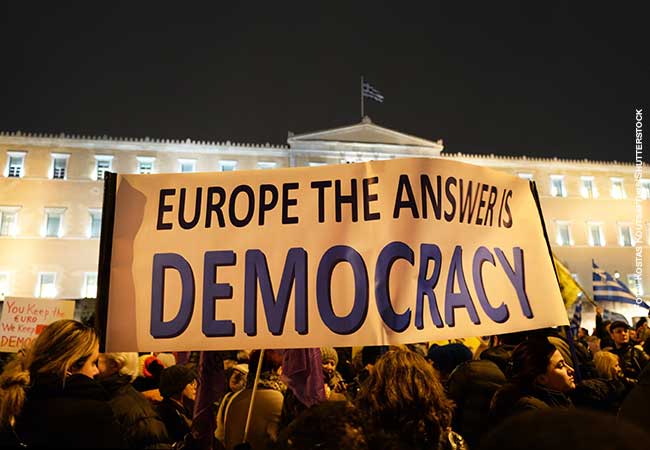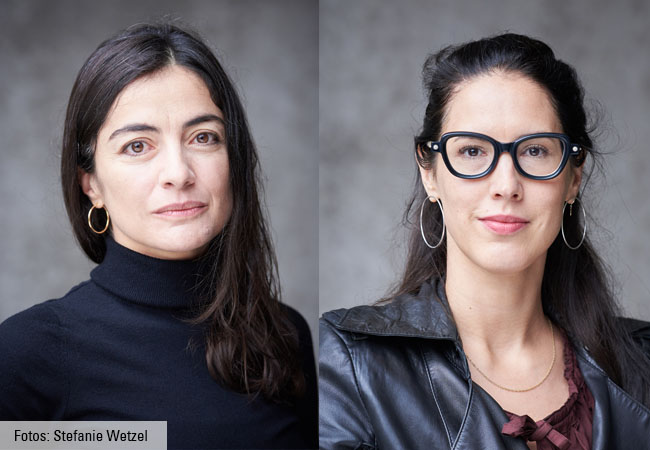
English-taught and research-based: the Comparative Democracy master’s degree programme will start in the winter semester.
Professor Julian Garritzmann is clearly looking forward to the next winter semester: it will see the start of the new degree programme he has launched together with his colleagues. Twenty places will initially be available for the master’s degree programme in Comparative Democracy, and there are plans for more. “There is considerable interest, and enquiries are arriving from throughout the world,” says Garritzmann. It is the first master’s programme in the subdomain “Comparative Politics”. “Our subject area is strong in research, with many professors, postdoctoral researchers and doctoral candidates, so developing such a degree programme was long overdue,” says Garritzmann.
A lecture series on “Comparative Politics” organised by Garritzmann is already up and running in the summer semester, and a doctoral colloquium is also dealing with the topic. In the other two political science subdomains, Political Theory and International Studies/Peace and Conflict Research, there have long been corresponding degree programmes. The master’s programme in Comparative Democracy will be the first entirely English-taught programme to be offered at the Faculty of Social Sciences – “This naturally makes us very interesting for an international clientele,” says Garritzmann, who completed his academic education and training in Zurich, Harvard and Florence, among others. Adequate English language skills are therefore a prerequisite for participating in the international degree programme. “Frankfurt is an ideal place for our degree programme – nowhere else in Germany does a city have such an international audience. Of course, we’re also hoping that it will allow us to contribute to the further internationalisation of Goethe University Frankfurt.”
Political science is a subject that has become more and more international over the last few years, meaning that the pertinent research literature is usually in English. Garritzmann says that by using results from a project within the programme “Starker Start ins Studium”, which helps students get off to a good start at university, it will be easy to integrate a diverse student body, such as is to be expected in the new master’s programme, into Frankfurt’s student culture.
Crisis of democracy
The thematic focus of the new degree programme consciously ties in with current debates: the crisis of democracy, the loss of trust in political institutions among the population, more and more non-voters and protest voters are just a few keywords that form the backdrop for comparative democracy research. “In Comparative Politics, we now have additional areas that are also working on these questions: political behaviour research, political economy and political institution research.” Garritzmann highlights one of the most important books of the last years on this topic: “How Democracies Die” by Steven Levitsky and Daniel Ziblatt. “The two authors show convincingly that in the course of a crisis gradual erosion sets in: first of political norms and political culture, then of institutions.”
Garritzmann is convinced that today’s students are very interested in these issues. Young people, he thinks, could also catalyse a new understanding of politics and democracy. “Comparative Politics can deliver insights into the conditions under which new participatory models of democracy work, and under which ones they do not. Because you can, of course, in theory think up all kinds of models of participation. But if the models are so complex that only highly educated academics participate in them, that is not expedient either and could even rather lead to more populism.”
Synthesis of theory and empiricism
Garritzmann emphasises that the MA Comparative Democracy is designed as an empirical-analytical degree programme. “Theoretical fundamentals are naturally very important, but we always also ask: What does reality look like, does it match the theory, or do we, by contrast, need to rethink the theory?” The programme therefore attaches great importance to empirical research. One of its focal areas is research designs and methods: “With Claudius Wagemann, we have an expert for qualitative social research, and with Constantin Ruhe, one for quantitative and experimental methods. It’s very important for us to educate our students so thoroughly that they can understand current research, are familiar with methods and statistics, and can contribute their understanding of these in class.
We must keep in mind that we’re training them for a research career, which can naturally mean very different things: on the one hand at the university, but also in neighbouring research institutes. Employment later on with employers’ confederations, unions and in journalism is a possibility as well.” Have empirical skills become more important in political science? “Yes, definitely,” is Garritzmann’s immediate answer. For a long time, political science was very theory-oriented, he says, which was also due to its origins in administrative science and law. A deductive-normative understanding of politics tended to dominate.
After the “empirical turn” had at some point seen to a different extreme, political science is today characterised by the spirit of methodological pluralism. The method, he says, depends strongly on the respective research question. “I like to speak of a theoretically guided, empirical-analytical science – a synthesis entirely in line with Hegel,” he says with a wink.
Venturing into research with interest and curiosity
Garritzmann has just read a term paper that greatly impressed him: a student had analysed tweets from a political science perspective and to do so written a computer programme to quantitatively evaluate them. “You can, of course, also quantitatively evaluate survey results or election manifestos.” Practical elements are a top priority in the new degree programme: a special practical module on research-based learning, for example, but also an internship, such as is also mandatory in other master’s programmes in the subject. “Political parties, ministries, institutions as well as the media lend themselves to this,” says Garritzmann.
How does he envisage the “ideal” student in the new programme? “For me, showing interest would be the most important thing. And through curiosity you can learn anything, even the most complicated theoretical and empirical topics.” If possible, students should already have acquired some prior knowledge of Comparative Politics during their bachelor’s degree. Lateral entry from sociology is also possible, and students can catch up on missing politics modules. “In general, students should be willing to take the plunge in a purely English-taught and research-based degree programme,” says Julian Garritzmann, summing up.
Further information on the Comparative Democracy degree programme.













